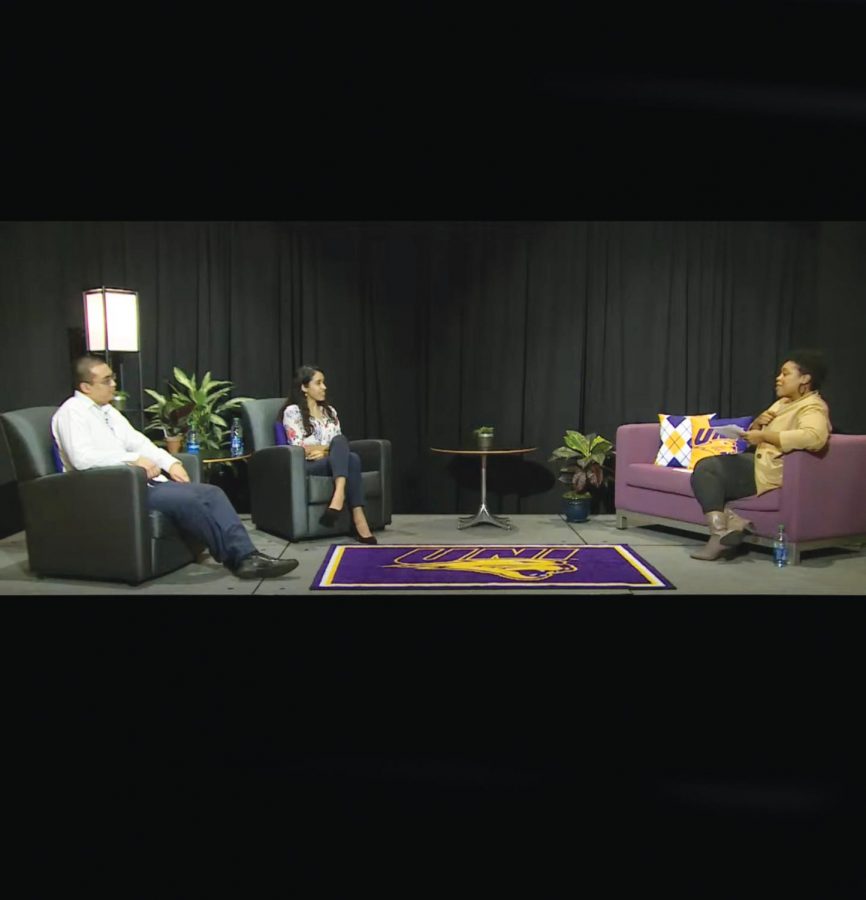REC talks activism on Purple Couch
Students Mohammed Rawwas and Laura Roman Jimenez of the Racial and Ethnic Coalition (REC) participate in a Purple Couch Courageous Conversation on November 11 with moderator Jamie Butler Chidozie.
Nov 16, 2020
UNI held its second Purple Couch Courageous Conversation on Wednesday, Nov. 11, this time tackling student activism in regards to UNI’s campus.
The Purple Couch Courageous Conversations is a series pointed at educating and communicating to the campus community about specific diversity, equity and inclusion topics. The program is facilitated as a talk show, monitored by Jamie Butler Chidozie, executive director of Diversity, Inclusion and Social Justice.
“Sometimes we have to uncover the ugly to get towards the beauty of what equity is,” Chidozie said during the conversation Wednesday evening. “We are unafraid to say we have a problem here, and there is a way where we can start to mitigate these things.”
Following the first Purple Couch Courageous Conversation in October, this month’s event featured two members of the Racial and Ethnic Coalition (REC), Laura Roman Jimenez and Mohammed Rawwas. Topics of discussion ranged from criticisms of student activism, the UNI institution itself and the structure in place in regards to rules being made.
Rawwas, a MIS, computer science and philosophy major, said, “We can’t really talk about transforming the university, in isolation, without talking about the societal transformation as a whole.”
He acknowledged what he feels is a lack of student voice.
“We really need to rethink who makes decisions at the university level,” he said.
Jimenez, a finance major, spoke about her own vision for UNI.
“My vision for the university is to be someone or to be a force that is actively striving to reach equality, inclusion and equity in regards to how students and staff feel on campus,” she said.
Both speakers discussed the issues that were propelled into the mainstream this last year, following the killings of George Floyd and Breonna Taylor.
“These have been issues for quite a long time, and they did not come from nowhere,” Jimenez said.
Rawwas spoke about the controversy surrounding activism, dating back to Dr. Martin Luther King Jr. Although a universally inspiring person now, at the time Dr. King was highly controversial to support, something that can be seen today in Black Lives Matter movements across the country.
“They could only do that work even if it was unpopular, so that we could reach the stage where we can look back on it and almost unanimously agree that it was a good thing,” he said.
Jimenez also spoke specifically about UNI’s campus and REC’s representation of minorities on campus and the pushback they have received from others.
“The idea that just because we share a similar identity means we share a monolithic experience at the university or even just on a basic level, is very untrue,” she said. “When you suddenly realize that you have privileges that other people don’t, it can make you very uncomfortable.”
Additionally, Jimenez went through the history of REC and its interaction with UNI’s administration. She stated that the students presented their issues to the administration in an open discussion, but after giving them “an ample amount of time,” saw no results.
“When we came back from summer break, there was not a lot of change done, so we had to go more on the attack phase,” she said.
Although some felt that REC should be grateful for the changes that did take place, Jimenez pushed back.
“Why should we be grateful you gave us some things, when here are all these things that we’re asking where we put in the work, and you only did half?” she asked.
Both speakers acknowledge that the work REC has done does not begin and stop with them.
Jimenez said, “We need to continue to push, to challenge, to be transformative and to hold the institution responsible.”
Rawwas added, “It really does require pushing the envelope more in order to see the changes that we need.”
Wrapping up, Chidozie addressed students engaging in activism.
“Activism serves as an invitation for any and everyone to engage in promoting systemic change,” she said. “Sometimes, these conversations can be uncertain, they can be challenging, but at the end of the day, we want to make sure we are not overcome by fear.”







